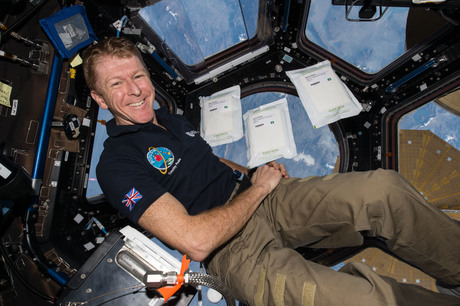
More than 600,000 children from schools and nurseries took part in the joint RHS and UK Space Agency “Rocket Science” experiment, planting and watching the seeds grow alongside each other to investigate the impact of microgravity, radiation and space travel on seed germination and gravity.
Published by the Royal Horticultural Society Campaign for School Gardening, the video shows Tim before he embarked on his Principia mission to the International Space Station (ISS), flipping a coin to decide which of two colour packets – red or blue – would contain the space seeds and which the control ‘earth’ seeds.
The space seeds in the blue packet then travelled to the International Space Station ahead of Tim on 2 September 2015 with European Space Agency (ESA) astronaut Andreas Mogensen.
Tim then took charge of the seeds when he arrived at the ISS in December.
After being held for six months in microgravity the 2kg of rocket seeds returned to earth with NASA astronaut Scott Kelly this March, and were then distributed with the control ‘earth’ seeds to 8,500 schools and nurseries across the UK.
Each school or nursery received 100 seeds that had been on the ISS and 100 that had remained on earth.
Already more than half of the settings involved have added their experiment data to a national online database, to be analysed by biostatisticians.
The results will be published this autumn and should help provide a clearer picture of the potential for astronauts to grow their own food on long space missions.
Busy Bees Pre-school in Ledbury, Hereford, took part in the experiment. Manager Emma Davies said, ‘We did the experiment with our older children aged three to four and they planted all the seeds themselves, we wanted them to be involved from the very beginning.’
‘They then used the rulers to measure and write down the numbers, we of course checked but thought it was very important for them to measure independently – they loved it from start to finish and really embraced the responsibility. We saw them grow in confidence and learn to take turns through having a structured, specific job to do everyday.
‘They also were so excited to see Tim Peake reveal which seed packet went into space. We did not see a difference in the growth of the seeds so maybe it shows that you can grow food in space. It was a massive success for us – it’s a shame they’re aren’t more things for a child to do like this, as I think science can sometimes be forgotten in the early years.’
Tim returned to Earth on 18 June and was reunited with his family after a six-month mission to the ISS.

Tim Peake with the seeds used in the experiment Photo: NASA - ESA
Tim said, ‘Throughout my time on the ISS I have kept an eye on the Rocket Science project via social media. It’s been amazing to see so many young people engaging on a science experiment on this scale and I’m sure we’ve successfully created a few more future scientists, horticulturalists and hopefully astronauts to continue work like this in years to come.’
RHS skills development manager Clare Custance said, ‘Results from Rocket Science will be published later this year in a full report which will also contain the positive impacts the project has had on young people that participated, as well as comments from the RHS, UK Space Agency and European Space Agency.
‘Whatever the result may be, for us the most important outcome of this experiment is that it has enabled hundreds of thousands of young people to engage with real plant science that has not been done in UK schools before.’
Libby Jackson, the UK Space Agency’s astronaut flight education programme manager, said, ‘We are delighted with the tremendous levels of participation in the Rocket Science project and await the results with great interest. Through the experiment, children have learnt about the importance of good scientific experimental protocol and about the challenges of feeding astronauts whilst they explore other planets. We hope that many of the 600,000 children who have taken part in Rocket Science will go on to be scientists and engineers of the future and a part of the UK’s booming space sector.’
To watch the YouTube video in full visit https://www.youtube.com/watch?v=SV6bXBt4Ug0









